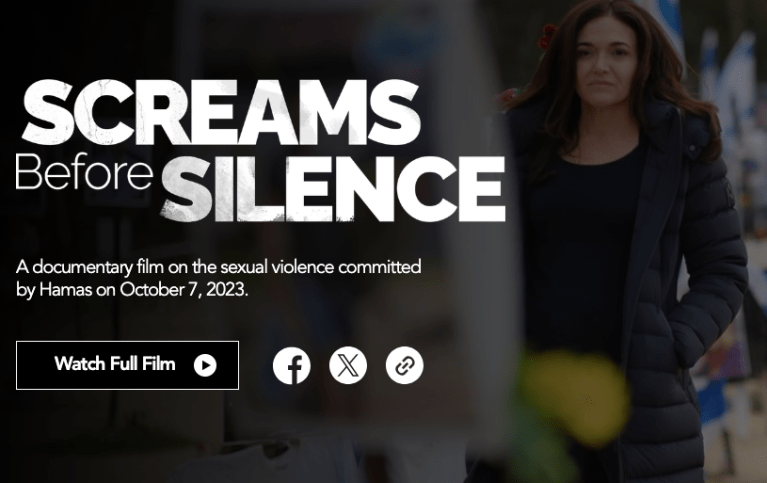By now there is ample evidence not only that sexual violence was part of Hamas’s attack on Israel on October 7, but also that this violence was part of the overall plen to brutalize and humiliate the Jews. This much has been admitted even by the United Nations, whose UN Women group took way too long to even denounce that violence.
The UN’s official report, whose summary you can find here, concludes this, though results are still coming in:
Based on the information it gathered, the mission team found clear and convincing information that sexual violence, including rape, sexualized torture, cruel, inhuman and degrading treatment has been committed against hostages and has reasonable grounds to believe that such violence may be ongoing against those still held in captivity. In line with a survivor/victim-centered approach, findings are conveyed in generic terms and details are not revealed.
In the context of the coordinated attack by Hamas and other armed groups against civilian and military targets throughout the Gaza periphery, the mission team found that there are reasonable grounds to believe that conflict-related sexual violence occurred in multiple locations during the 7 October attacks, including rape and gang-rape in at least three locations, namely: the Nova music festival site and its surroundings, Road 232, and Kibbutz Re’im. In most of these incidents, victims first subjected to rape were then killed, and at least two incidents relate to the rape of women’s corpses.
The mission team also found a pattern of victims, mostly women, found fully or partially naked, bound, and shot across multiple locations. Although circumstantial, such a pattern may be indicative of some forms of sexual violence, including sexualized torture, cruel, inhuman and degrading treatment.
. . .Overall, the mission team is of the view that the true prevalence of sexual violence during the 7 October attacks and their aftermath, may take months or years to emerge and may never be fully known.
Although the report has a bit of both-sideism by mentioning “allegations of conflict-related sexual violence” committed by “Israeli security forces and settlers,” none of that has been documented. Although those allegations persist, most, at least since October 7, have been retracted—even by Hamas.
Nevertheless, part of the attack on Israel is “rape denialism”: either denying that any sexual violence took place (“no proof,” some people say), or to admit that there may have been a small amount, but it was ancillary and not part of the strategy of Hamas (here’s one example of that denialism). The denialism is, of course, part of the denigration of Israel and Jews that has followed October 7.
If you have any doubts about the existence or extent of sexual violence, read the full UN report, remembering that the UN investigatory visit to Israel took place mostly during February of this year. But first, I’d highly recommend that you watch this hourlong movie, “Screams Before Silence”. Created by Sheryl Sandberg; it received its premiere just two days ago and has already been made public for free. I’m putting the link here and urge you to watch it, even if you’re squeamish. It is immensely moving, disturbing, and yet heartening as the survivors struggle to tell their tale because they want people to know what happened. Most of all, it’s convincing.
As the Times of Israel reports about the movie,
The hour-long film, created in cooperation with Israel’s Kastina Productions, provides first-hand accounts from survivors, freed hostages, first responders, and legal, medical, and forensic experts. Sandberg is present throughout the film either interviewing individuals in a studio or accompanying them to October 7-related sites.
What emerges is not only an understanding of the mass scale and barbarism of Hamas’s sexual attacks against women but also their deliberate, pre-meditated, and systematic nature.
“When the body of the woman is violated, it symbolizes [the violation] of the body of the whole nation,” Prof. Ruth Halperin-Kaddari, former vice-president of the United Nations Commission on the Elimination of Discrimination Against Women, says in the documentary.
The film’s testimonies detail a horrific truth that was largely brushed aside by a report released earlier this week by United Nations Secretary-General Antonio Guterres, in which he declined to include Hamas among organizations suspected by the UN of committing acts of sexual violence during conflict. That report noted there is evidence that sex crimes were committed during the Palestinian terror group’s devastating October 7 attack on Israel, but did not specifically attribute responsibility to Hamas.
Guterres is, of course, an odious, Israel-hating git, and that’s nowhere better demonstrated than in his refusal even now to admit that Hamas committed sexual violence during its attack. (It also, as you’ll see in the movie, did so to some of the hostages.) Since many of the victims are dead, and there is still a dearth of witnesses, much less bodies that can give evidence of rape or other sexual violence, there is certainly enough to buttress the UN’s report—and to show Guterres up as the liar he is.
But I digress. In this movie, which you can see by clicking below, Sandberg largely stands aside but listens as survivors, witnesses, and forensic experts tell the story. If this doesn’t move and anger you, well, I don’t know how that could happen to anyone with a heart.
Click below and then on the “watch full film” box. NOTE: Some of the material is not for those who can’t bear to hear about the often horrible violence done to women. As I said, if you are squeamish about that, you might not want to watch. I was horrified at some parts, but I also think that one can’t comprehend such a phenomenon without confronting it directly rather than through words like “sexual violence happened.” But your mileage may vary.













